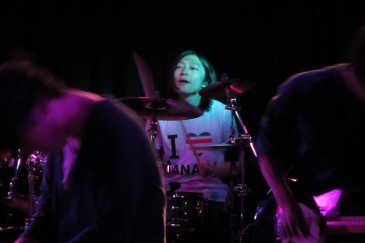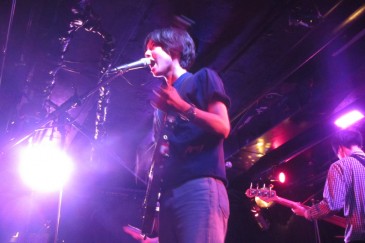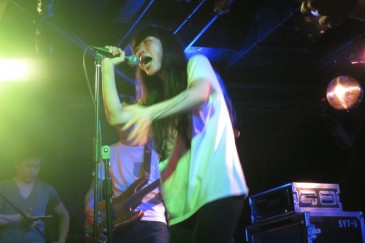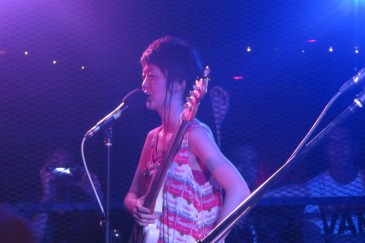
Every year, the same too-weird-to-be-true story makes the rounds just before, and then hyperbolically during, the annual event that is Next Music From Tokyo. The tour, run by one Steven Tanaka, hand-picks the best of Tokyo’s underground music scene and then carries them across Canada on what has to be the most ambitious project in Japanese-Canadian relations in recent history. The story, as it so rarely does these days, gets better. Tanaka, a Toronto anaesthesiologist, is the sole organizer, promoter, tour manager, and translator for the entire tour, which is paid for out of his own pocket. That’s right—one of the most unique musical opportunities in North America comes from a doctor doing charity work.
Atlantis Airport was the band that might have had the most in common with Vancouver bands, were it not for the language barrier and the math/prog-rock infusions. At their heart a pop band, the group’s strengths were in their continual stop-start dynamics and incredible synchronized breaks. Their frontwoman, Sone, didn’t do half as good a job performing as keyboardist Yoden did, who made sure to take selfies with the crowd, crowd-surf with his instrument, and dance better than the still-cold audience. It was silly and remarkably impressive all at the same time.

PENs+ was the Japanese emo version of ex-locals Oh No! Yoko: prodigiously talented but with enough of the awkwardness associated with youth to feel for them. The two phenomenal guitarists, Ryo Arai and Mao Ariga, built off of each other’s infectious mathy guitar licks to construct intense note-heavy interludes between verses. The lyrics sounded pretty sappy—even in a language half the crowd couldn’t understand—but the band’s tight musicianship made up for their young age and any naivety.

Otori was the early winner of the night with absolutely over-the-top energy levels and an extremely tight performance. The quartet’s brand of hardcore, mixed with noise and thrash elements, could only work under its contradictions: their MC, Kobara Sae, was a tiny lady violently assaulting the microphone with anger and fury, alternating between shouting and an almost rap-like rhythm; and their stone-cold guitar player, Hino Tetsuya, was as calmly collected during the band’s many outbursts as if Otori was better known for classical orchestra. From the word “go,” Otori were animated, ferocious, and intimidatingly fun to listen to.

Mothercoat brought the “weird” of the evening (which all other NMFT tours have incorporated to varying degrees) with their hyper-infused version of pop music. Although their first few songs were hard to get adjusted to, the band hit their stride in the middle of the set and finished strong with an infinitely memorable grand finale. Mothercoat blended jazz, dance, math, and progressive influences into something beautiful and hilarious. Frontman Gigadylan, who frequently added bizarre synth and sequenced vocal effects to the mix, was mesmerizing, even when his vocal experimentations bordered on the ridiculous.
And then there was OWARIKARA. In true NMFT tradition, Tanaka saved the best, and most unifying, for last. The band, whose name translates as “starting at the end,” were the most soulful personification of true psych rock to ever grace west of the Rockies, and truly the one with the best stage presence. These four musicians treated the stage, and their set, like one giant party—but unlike a slew of their American contemporaries, that didn’t lead to a sloppy performance and an atmosphere of slackerdom. Giant guitar solos, sexy bass played by an even sexier Fumihiko Tsuda in the best glam-rock outfit of all time—their already-extended 45 minute set really seemed like a three-hour endurance competition, trying to see whether the musicians or their crowd would last longest. As an end not only to the show, but also to the five bands’ time in Canada, OWARIKARA’s five-minute long outro was exactly what all of us—even the ones performing—really needed.

